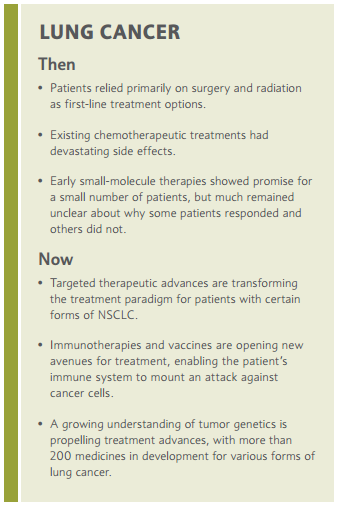
Lung cancer is the leading cause of cancer death among men and women in the United States, and each year, tens of thousands of Americans are diagnosed with the most common form, non-small cell lung cancer (NSCLC). Despite these sobering statistics, there is reason for optimism in the fight against NSCLC.
In the last decade, advances in cancer biology have led to tremendous improvements in surgical techniques and treatment. And as researchers continue to expand their knowledge of NSCLC, they have uncovered a number of genetic mutations that cause uncontrolled cancer cell growth. Today, two-thirds of NSCLCs have a genetic mutation that can directly point to treatments known to be effective against that type of mutation, and more are being discovered.
 This better understanding of tumor biology has led to the development of novel targeted therapies that are transforming the treatment paradigm for NSCLC patients. Many of these targeted therapies are administered orally, reducing the burden on patients who previously underwent extensive intravenously-administered chemotherapeutic regimens. A new era of immunotherapy and vaccines is also opening avenues for treatment, enabling the patient’s immune system to mount an attack against cancer cells. These therapeutic advances are unfolding quickly as the science evolves rapidly.
This better understanding of tumor biology has led to the development of novel targeted therapies that are transforming the treatment paradigm for NSCLC patients. Many of these targeted therapies are administered orally, reducing the burden on patients who previously underwent extensive intravenously-administered chemotherapeutic regimens. A new era of immunotherapy and vaccines is also opening avenues for treatment, enabling the patient’s immune system to mount an attack against cancer cells. These therapeutic advances are unfolding quickly as the science evolves rapidly.
Because cancer cells are able to evade and adapt to various treatments, and may develop other mutations, it is imperative NSCLC patients have several treatment options. This allows patients to switch to another medicine when their current treatment no longer works. It is also why the framework from the Institute for Clinical and Economic Review (ICER) is concerning.
ICER’s draft evidence report on treatments for NSCLC indicates that they consider these life-changing treatments of low value. This is in stark contrast to experts in the field of oncology, including the American Society of Clinical Oncology, which named immunotherapies for NSCLC as the “Advance of the Year” in 2016.
The disconnect between what ICER views as being valuable and what oncologists who treat patients see as valuable is startling. As stakeholders increasingly call for movement toward more personalized, individualized care, ICER persists with static, one-size-fits all assessments of value. This is in direct contradiction to the objectives of widely heralded policy initiatives like the Precision Medicine Initiative and the Cancer Moonshot.
In a blog post about the draft evidence report, the Personalized Medicine Coalition notes that “the organization’s value assessment process has, by design or perhaps inadvertently, no mechanism for capturing the value of targeted medicines, since its model is built on population averages.” In comments regarding ICER’s recent report on multiple myeloma treatments, patient advocates stated that “ICER’s framework is not consistent with the current thinking in regard to the future of cancer treatment. The trend is towards more personal, customized approaches and not subjecting every patient to the same treatment regimen.”
While the rest of the health care community moves forward together, ICER has dug in its heels. If they continue to make judgments of value that ignore the complexities of treating patients with diseases like NSCLC, they will be left behind in the shift toward a personalized, value-driven health care system.




 This better understanding of tumor biology has led to the development of novel targeted therapies that are transforming the treatment paradigm for NSCLC patients. Many of these targeted therapies are administered orally, reducing the burden on patients who previously underwent extensive intravenously-administered chemotherapeutic regimens. A new era of immunotherapy and vaccines is also opening avenues for treatment, enabling the patient’s immune system to mount an attack against cancer cells. These therapeutic advances are unfolding quickly as the science evolves rapidly.
This better understanding of tumor biology has led to the development of novel targeted therapies that are transforming the treatment paradigm for NSCLC patients. Many of these targeted therapies are administered orally, reducing the burden on patients who previously underwent extensive intravenously-administered chemotherapeutic regimens. A new era of immunotherapy and vaccines is also opening avenues for treatment, enabling the patient’s immune system to mount an attack against cancer cells. These therapeutic advances are unfolding quickly as the science evolves rapidly.